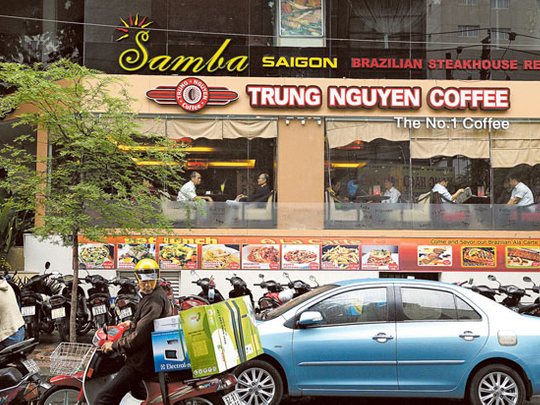
Dubai: With global coffee bean prices in boiling hot range, it does make things a little difficult for a brand to brew a growth strategy in a new market. But this is just what Trung Nguyen Coffee from Vietnam — the world’s second largest coffee producing and exporting country — is attempting to do in the UAE with its regional franchisee, Global Hotels Management (GHM) Group.
While the intention is to have its own branded cafés at some point, the partners are looking to build up brand awareness through multiple channels — initially wholesale through various distribution channels and also targeting hospitality chains and airlines. “We’ll be available in speciality cafés as Trung Nguyen and opening our first two flagship coffee shops and display centre in 2015,” said Masood Hashim, CEO of GHM Group. The brand is new to the Middle East, but is already well-known in over 60 countries.”
But all of this will come against the backdrop of bean prices that have been scaling quite a few highs. “Arabica beans price have increased by approximately 75 per cent versus October 2013, and Robusta beans by around 25 per cent,” said Nguyen Nguyen, General Manager at Trung Nguyen Franchising Corp. “No major impact of this price increase has yet been visible to consumers.
“In case this price increase continues at the same pace and the pressure towards profitability becomes higher for companies, an overall increase of consumer prices cannot to be excluded in the near future. Stock availability will play a significant role.”
According to Nguyen, “Consumer prices are ruled by competitiveness between the companies (and) do not always follow the fluctuation of the commodity prices. Our company has managed due to retain its price list of finished products to the trade ... up to this point.”
While Brazil is the largest Arabica producer, Vietnam holds the status when it comes to global Robusta supply. The current cycle of upward pressure on prices have “to do with weather conditions that are influencing the expected output of major coffee producing countries,” said Nguyen. At the same time, increasing demand of emerging coffee markets cannot be met by expected supply. This factor has resulted in the overall price increase.”
Apart from those outlets operated by Starbucks and Costa, the local F&B space has been seeing niche offerings such as Selamliique, which purveys Turkish coffee. More speciality operators are waiting in the wings at locations such as the Citywalk in Jumeirah.
As with coffee, tea is also getting the specialist treatment, and with ample reason. “Over the last couple of years, UAE’s tea consumption has had a steep rise, reaching about 7 million kilograms per annum,” said Adel Sajan, Director at Cha Cha Chai, the cafe brand. “Consumption of coffee has also recorded a growth rate of 85 per cent between 2010 and 2013.
“With independent cafés on the rise and more players trickling into the region, it is evident that this trend in the UAE will eventually catch up with the rest of the world’s thriving cafe cultures. In such a situation, price escalates because of higher production costs and thereby impacting margins of sellers adversely.”











